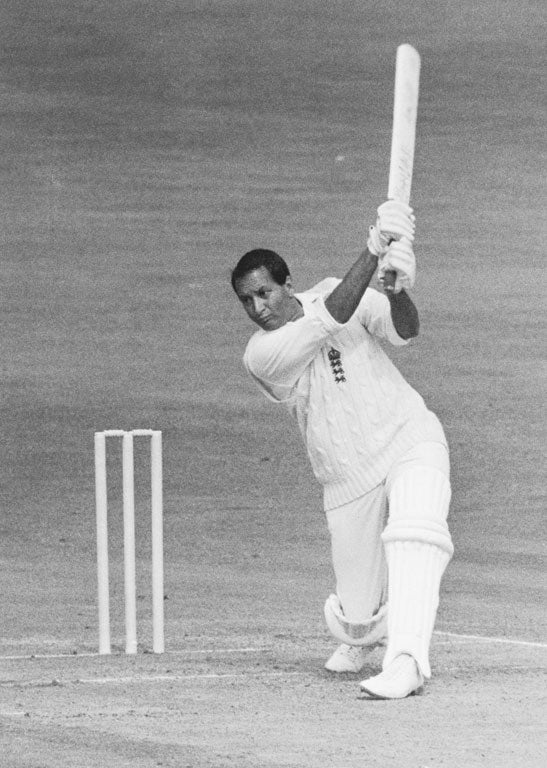Basil D'Oliveira: Cricketer who became a symbol of sport's struggle against apartheid

When the full history of the rise and fall of apartheid comes to be written, the name of the cricketer Basil D'Oliveira may not be in the front rank alongside Mandela and Mbeki but it will feature prominently in the narrative.
Because he was a player classified then as a "Cape coloured" and denied first-class status in his home land, in 1960 he migrated to England, where he graduated through county cricket to Test match status. He was chosen as part of an England team to tour South Africa in 1968, but his name was rejected by the South African government so England cancelled the tour. Other cricketing nations, and then other sports, supported their stance and the subsequent isolation of South Africa from international contests for 25 years advertised the nature of the regime around the world.
White South African cricketers, denied international cricket, emigrated to England and Australia, their presence being a constant reminder of what was happening at home. Compared with the suffering of ANC activists in the Republic, "Dolly" could not be described as a martyr for the cause but he did represent, to the sporting world, a symbol of what was wrong in one of the great sporting nations. He was a handsome man of great charm, modest about his accomplishments, who almost certainly wished, in his playing days, that he could be judged purely as a cricketer and not as a political flag waver.
His name is already attached to the Trophy for which England and South Africa play a Test series. There will come a day in South Africa when a statue is erected to his memory and, perhaps, a Test ground named after him.
"Dolly" was a right-handed middle-order batsman with a short backlift and powerful forearms that made him a feared and forceful hitter once established. He could also bowl deceptive medium-pace seam and swing and was more than a useful off-spinner. His classic sideways stance made him an attraction whether batting or bowling; as he was also an outstanding catcher at slip, his prowess was soon recognised beyond the small grounds and poor pitches to which he was confined by South African law. He was reputed to have scored 80 centuries at that level.
He realised that he could not progress as a professional cricketer at home, and through the agency of John Arlott, the most radical of English cricket pundits, who was also the chairman of the English Professional Cricketers' Association, the England and Glamorgan all-rounder Alan Watkins and the cricket correspondent of the Manchester Evening News, John Kay, he was offered £450 to join Middleton, Kay's former club, in the Central Lancashire League. Raffles, dances and fêtes around his tenement home raised the £200 he needed for his air fare but he had to leave his wife, Naomi, and son behind for that first summer in England
I saw him bat on a pudding pitch on a grey Saturday afternoon at Middleton in 1960 and told Daily Express readers that he was unlikely to make an impact in county cricket. Lancashire must have thought similarly, for they watched him several times, but it was Worcestershire who offered him a contract, and for whom he made his début, aged 33, in 1965.
He promptly hit five centuries and took 35 wickets in his first summer and the following year made his début for England. In 1968 against Australia he headed the batting averages and was second in the bowling, so his omission from the tour party to South Africa, chosen at the end of that summer, was both surprising and controversial.
MCC, then the governing body, insisted that the selection was made purely on cricketing grounds, but the suspicion has always remained that the selectors were well aware that D'Oliveira would not be admitted to his home land and chose to preserve a Test series rather than defend a matter of principle. They came under sustained and prolonged fire, not only from Arlott and other leading cricket writers, but also from EW Swanton, considered the voice of the establishment.
When Tom Cartwright of Warwickshire, who was principally a bowler, dropped out of the party through injury, the selectors had little option but to name D'Oliveira, with the inevitable consequence. A former England captain, The Rev David Sheppard, roused non-cricketing opinion and the News of the World stirred the pot further by announcing that D'Oliveira would report the tour for them.
"Dolly" remained smiling and dignified throughout the furore, happily piling his runs, wickets and catches for Worcestershire. Under pressure he could be a formidable and unrelenting opponent: he won a one-day final at Lord's despite a severe leg injury and when sledged by a Yorkshire bowler at Hull kept the opposition in the field all day while he compiled 227.
He continued playing until he was 48 and then, as Worcestershire's coach, he had the pleasure of seeing his son Damian enter first-class cricket. He passed 1,000 runs for the season nine times and played 44 times for England.
In 1969 he was appointed OBE,advanced to CBE in 2005, and when in 1991 South Africa returned to Testcricket he was able to return home to be fêted as a hero in the townships and by cricketers everywhere. In 2004 he attended the opening of a £700,000 new stand named after him at Worcestershire's county ground at New Road, Worcester, but Parkinson's Diseaseprevented him from making many public appearances.
Basil Lewis D'Oliveira, cricketer: born Cape Town, South Africa 4 October 1931; OBE 1969, CBE 2005; married 1960 Naomi Brache (two sons); died 19 November 2011.
Subscribe to Independent Premium to bookmark this article
Want to bookmark your favourite articles and stories to read or reference later? Start your Independent Premium subscription today.

Join our commenting forum
Join thought-provoking conversations, follow other Independent readers and see their replies